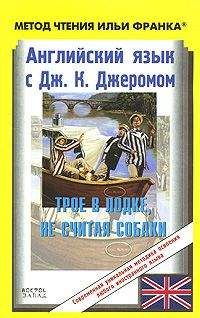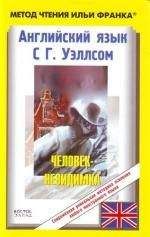Jerome Jerome - Английский язык с Джеромом К. Джеромом. Трое в лодке, не считая собаки (ASCII-IPA)
There is no spot in the world where you can get more fishing, or where you can fish for a longer period (нет такого места в мире, где можно получить больше рыбной ловли = где можно предаваться рыбной ловле больше или где можно рыбачить в течение более длительного времени). Some fishermen come here and fish for a day, and others stop and fish for a month (одни рыболовы приезжают сюда и рыбачат один день, другие остаются и удят месяц). You can hang on and fish for a year, if you want to: it will be all the same (вы можете задержаться и рыбачить /целый/ год, если хотите — разницы не будет: «будет все то же самое»; to hang on — крепко держаться, упорствовать; ждать; all the same — все равно, безразлично).
district ['dIstrIkt] guide [gaId]
Some people do. They never catch them. I never knew anybody catch anything, up the Thames, except minnows and dead cats, but that has nothing to do, of course, with fishing! The local fisherman's guide doesn't say a word about catching anything. All it says is the place is "a good station for fishing;" and, from what I have seen of the district, I am quite prepared to bear out this statement.
There is no spot in the world where you can get more fishing, or where you can fish for a longer period. Some fishermen come here and fish for a day, and others stop and fish for a month. You can hang on and fish for a year, if you want to: it will be all the same.
The Angler's Guide to the Thames says that "jack and perch are also to be had about here («Путеводитель рыболова по Темзе» говорит, что «щучку и окуня тоже можно поймать здесь»; jack — молодая щука, щучка)," but there the Angler's Guide is wrong (но тут «Путеводитель рыболова» ошибается). Jack and perch may be about there (могут водиться здесь). Indeed, I know for a fact that they are (действительно, я точно знаю, что они водятся). You can see them there in shoals, when you are out for a walk along the banks (вы можете увидеть их на мелководье, когда гуляете по берегу): they come and stand half out of the water with their mouths open for biscuits (они подплывают и высовываются наполовину из воды, открывая рты /желая получить/ печенье). And, if you go for a bathe, they crowd round (а когда идете купаться, они теснятся вокруг), and get in your way, and irritate you (и мешают вам, и раздражают вас). But they are not to be "had" by a bit of worm on the end of a hook, nor anything like it — not they (но их не поймать на кусочек червяка на конце крючка или на что-нибудь подобное — ну уж нет)!
I am not a good fisherman myself (сам я неважный рыболов). I devoted a considerable amount of attention to the subject at one time (я посвящал значительную часть внимания этому делу одно время), and was getting on, as I thought, fairly well (и делал успехи в нем, как полагал, довольно неплохие); but the old hands told me that I should never be any real good at it, and advised me to give it up (но старые рыбаки сказали мне, что я никогда не стану действительно хорош в этом занятии, и посоветовали мне бросить его). They said that I was an extremely neat thrower (они сказали, что я чрезвычайно искусный метатель = замечательно закидываю удочку; neat — чистый, аккуратный; искусный, ловкий), and that I seemed to have plenty of gumption for the thing, and quite enough constitutional laziness (что, кажется, я обладаю большой сообразительностью для этого дела и у меня вдоволь врожденной лености). But they were sure I should never make anything of a fisherman (но они были уверены, что я никогда не стану рыболовом). I had not got sufficient imagination (у меня не было достаточно воображения).
extremely [Ik'stri:mlI] sufficient [ [email protected]'fIS(@)nt]
The Angler's Guide to the Thames says that "jack and perch are also to be had about here," but there the Angler's Guide is wrong. Jack and perch may be about there. Indeed, I know for a fact that they are. You can see them there in shoals, when you are out for a walk along the banks: they come and stand half out of the water with their mouths open for biscuits. And, if you go for a bathe, they crowd round, and get in your way, and irritate you. But they are not to be "had" by a bit of worm on the end of a hook, nor anything like it — not they!
I am not a good fisherman myself. I devoted a considerable amount of attention to the subject at one time, and was getting on, as I thought, fairly well; but the old hands told me that I should never be any real good at it, and advised me to give it up. They said that I was an extremely neat thrower, and that I seemed to have plenty of gumption for the thing, and quite enough constitutional laziness. But they were sure I should never make anything of a fisherman. I had not got sufficient imagination.
They said that as a poet, or a shilling shocker (сказали, что в качестве поэта, /автора/ дешевых бульварных романов), or a reporter, or anything of that kind, I might be satisfactory (репортера или чего-нибудь в этом роде я, может, буду достаточным = добьюсь успеха; satisfactory — удовлетворительный; достаточный; приятный, хороший), but that, to gain any position as a Thames angler (но чтобы получить какое-нибудь положение = сделать имя в качестве удильщика на Темзе), would require more play of fancy, more power of invention than I appeared to possess (потребовалось бы больше фантазии, больше способности к выдумке, чем я, видимо, имел; play — игра, представление; деятельность; простор; to appear — казаться, иметь вид, выглядеть).
Some people are under the impression that all that is required to make a good fisherman (некоторые ошибочно полагают, что все, что требуется, чтобы стать хорошим рыболовом) is the ability to tell lies easily and without blushing (это способность легко врать, не краснея; blush — румянец, краска стыда, смущение); but this is a mistake (но это ошибка). Mere bald fabrication is useless (всего лишь голое/неприкрытое вранье бесполезно; fabrication — выдумка; подделка, ложь); the veriest tyro can manage that (любой новичок может с этим справиться). It is in the circumstantial detail (именно в массе подробностей; circumstantial — подробный, обстоятельный), the embellishing touches of probability (в приукрашивающих штрихах правдоподобия), the general air of scrupulous — almost of pedantic — veracity (в общей атмосфере скрупулезной, почти педантичной правдивости), that the experienced angler is seen (вот в чем виден опытный рыбак).
possess [ [email protected]'zes] scrupulous ['skru: [email protected]] veracity [ [email protected]'r&sItI]
They said that as a poet, or a shilling shocker, or a reporter, or anything of that kind, I might be satisfactory, but that, to gain any position as a Thames angler, would require more play of fancy, more power of invention than I appeared to possess.
Some people are under the impression that all that is required to make a good fisherman is the ability to tell lies easily and without blushing; but this is a mistake. Mere bald fabrication is useless; the veriest tyro can manage that. It is in the circumstantial detail, the embellishing touches of probability, the general air of scrupulous — almost of pedantic — veracity, that the experienced angler is seen.
Anybody can come in and say (любой может войти и сказать), "Oh, I caught fifteen dozen perch yesterday evening (я поймал пятнадцать дюжин окуней вчера вечером);" or "Last Monday I landed a gudgeon, weighing eighteen pounds (в прошлый понедельник я вытащил пескаря, весившего восемнадцать фунтов), and measuring three feet from the tip to the tail (и длиной три фута от головы до хвоста; to measure — измерять, иметь размер; tip — кончик, верх, верхушка)."
There is no art, no skill, required for that sort of thing (не требуется ни искусства, ни умения для вещей подобного рода). It shows pluck, but that is all (это показывает смелость, только и всего).
No; your accomplished angler would scorn to tell a lie, that way (нет; настоящий рыбак не стал бы лгать таким образом; accomplished — законченный, полный, совершенный; настоящий; to scorn — презирать, не принимать, считать неприемлемым). His method is a study in itself (его способ — наука по своей природе = целая наука).
He comes in quietly with his hat on, appropriates the most comfortable chair (он входит спокойно, не снимая шляпы: «с надетой шляпой», садится на самый удобный стул; to appropriate — присваивать; конфисковать), lights his pipe, and commences to puff in silence (зажигает свою трубку и начинает пускать клубы дыма молча). He lets the youngsters brag away for a while, and then, during a momentary lull (он позволяет молодежи хвастаться некоторое время, а потом, во время короткого перерыва; momentary — моментальный, преходящий, кратковременный; lull — временное затишье; временное успокоение; перерыв), he removes the pipe from his mouth, and remarks (он вынимает трубку изо рта и замечает; to remove — передвигать, перемещать; снимать), as he knocks the ashes out against the bars (выбивая пепел о решетку /камина/):
weighing ['weIIN] momentary [' [email protected]@nt(@)rI]
Anybody can come in and say, "Oh, I caught fifteen dozen perch yesterday evening;" or "Last Monday I landed a gudgeon, weighing eighteen pounds, and measuring three feet from the tip to the tail."
There is no art, no skill, required for that sort of thing. It shows pluck, but that is all.
No; your accomplished angler would scorn to tell a lie, that way. His method is a study in itself.
He comes in quietly with his hat on, appropriates the most comfortable chair, lights his pipe, and commences to puff in silence. He lets the youngsters brag away for a while, and then, during a momentary lull, he removes the pipe from his mouth, and remarks, as he knocks the ashes out against the bars:
"Well, I had a haul on Tuesday evening that it's not much good my telling anybody about (у меня был такой улов во вторник вечером, что мне не следует никому /даже/ рассказывать о нем; haul — волочение, тяга; улов /рыбы/; добыча)."
"Oh! why's that (это почему)?" they ask (спрашивают они).
"Because I don't expect anybody would believe me if I did (потому что не думаю, что кто-нибудь поверит мне, если я расскажу; to expect — ждать; надеяться, полагать)," replies the old fellow calmly, and without even a tinge of bitterness in his tone (отвечает старик спокойно, и даже без тени горечи в голосе; tinge — легкая окраска; оттенок, тон; привкус), as he refills his pipe (вновь наполняя = набивая трубку), and requests the landlord to bring him three of Scotch, cold (и просит трактирщика принести ему три рюмки/порции холодного шотландского виски; landlord — домовладелец; хозяин гостиницы, пансиона и т.д.).
There is a pause after this, nobody feeling sufficiently sure of himself to contradict the old gentleman (после этого наступает пауза, никто не чувствует себя достаточно уверенно, чтобы возражать старому джентльмену). So he has to go on by himself without any encouragement (поэтому ему приходится продолжать самому, без какой-либо поддержки).



